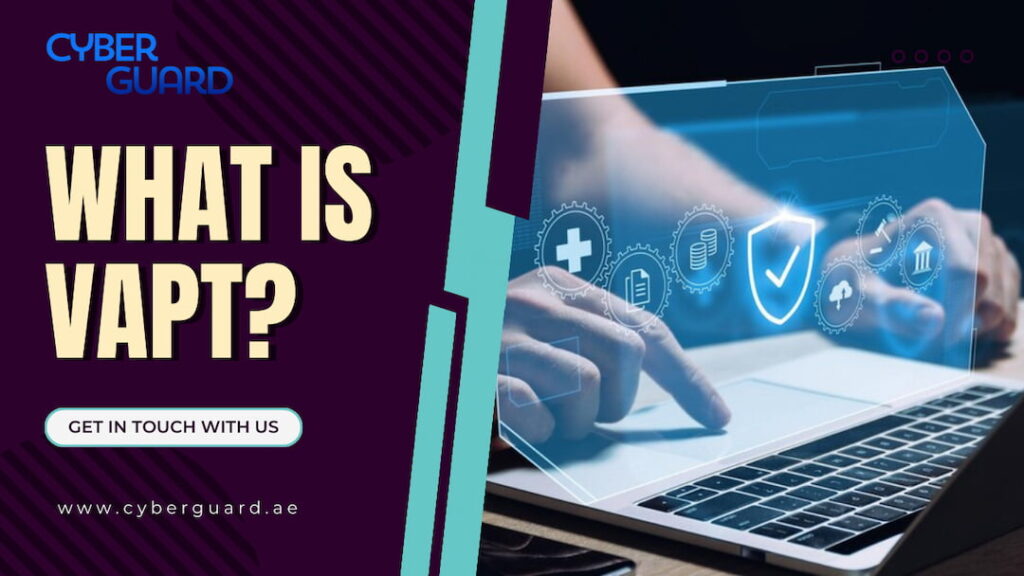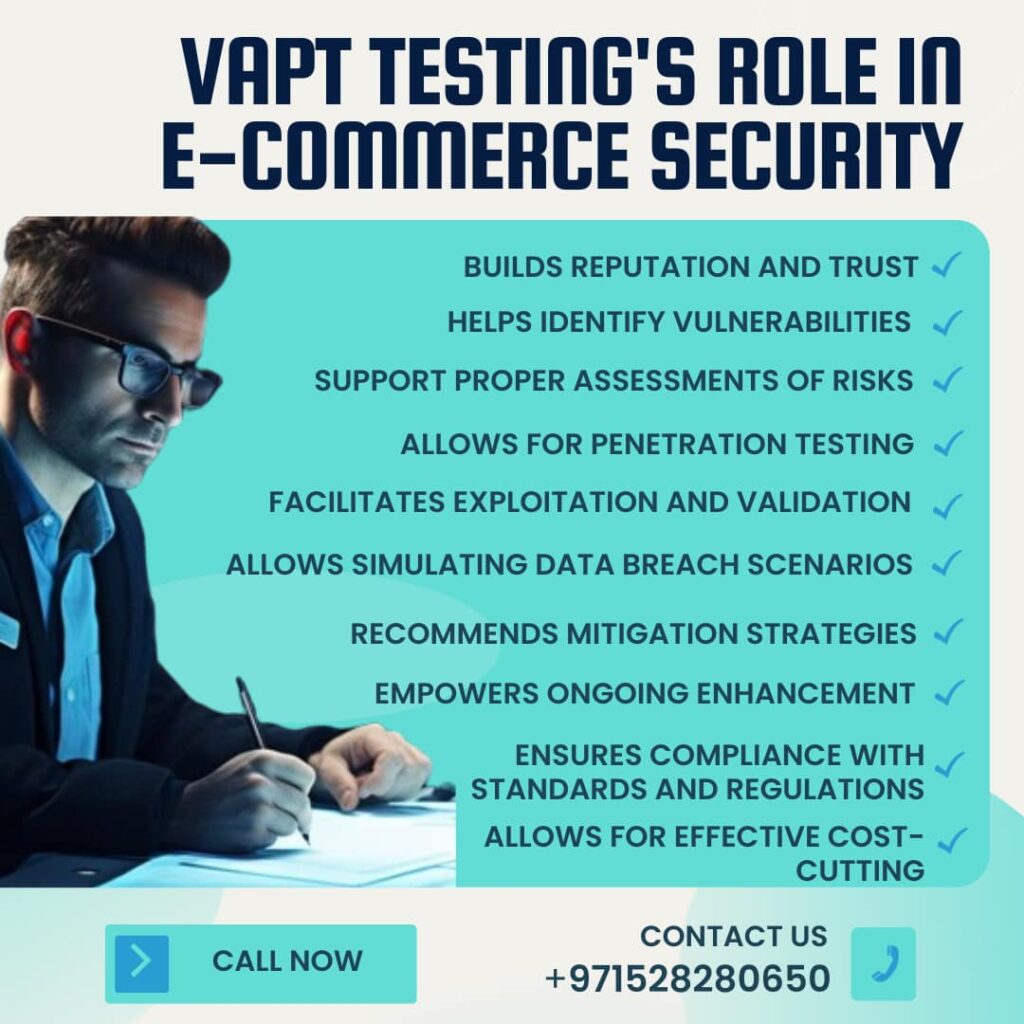Online shopping has become widespread everywhere and is sure to stay. People prefer online shopping to traditional methods as it offers more convenience and options for making informed purchasing decisions. With tight competition in the online shopping segment, people’s choice of an e-commerce website will largely depend on various factors, including the security it guarantees. This is where the role of VAPT in ensuring ecommerce website security comes into play.
What is VAPT?
VAPT or Vulnerability Assessment and Penetration Testing is a security testing procedure where the vulnerabilities associated with a computer system, network or any of its related applications are tested meticulously for potential vulnerabilities and real-world threats.

Role of VAPT Testing in Ensuring Ecommerce Website Security
As long as you want to run your e-commerce business smoothly and intend to scale it up, you can’t ignore its reputation and the digital assets it holds. With a growing number of security threats like cyber-attacks, phishing and ransomware posing potential risks to your ecommerce website security, VAPT promises the best safety mechanism to thwart them all. Here discussed is the role of VAPT in ensuring ecommerce website security in the context of e-commerce business.

Helps identify vulnerabilities
VAPT helps identify the security vulnerabilities and gaps in your e-commerce website’s infrastructure. Thus, you are in a better place to take proactive measures to mitigate these vulnerabilities.
Support proper assessments of risks
Through VAPT, you can get a proper assessment of the risks that your e-commerce website may encounter. This helps you prioritize security efforts based on assessment findings.
Allows for penetration Testing
Penetration testing or simulating cyber-attacks to pinpoint vulnerabilities that may go unnoticed is part of the VAPT procedure. This helps you get practical insights into the effectiveness of your existing E-commerce security measures.
Facilitates exploitation and Validation
If any vulnerabilities are found in penetration testing, they need to be exploited or tested to figure out to what extent they can go. This simulated exploitation and validation process helps identify the practical implications of these vulnerabilities.
Allows simulating data breach scenarios
VAPT allows you to simulate various scenarios where potential data breaches can occur and where your website has the upper hand in handling them. You can plan your e-commerce security measures accordingly as a response mechanism.
Recommends mitigation strategies
VAPT for E-commerce security is a great option for having a proper overview of strategies and solutions to mitigate the pinpointed vulnerabilities. It recommends a clear plan for addressing those potential security concerns
Empowers ongoing enhancement
VAPT empowers you to design a cycle for ongoing risk assessment and enhancement utilizing the inputs from vulnerability assessment tests. This is a perfect way to ensure that your website can adapt to evolving threats.
Ensures compliance with standards and regulations
Conducting VAPT for E-commerce security is part of adhering to government regulations and industry standards. It will save you from any penalties or legal complications due to non-compliance.
Builds reputation and trust
Demonstrating that you are committed to ensuring Ecommerce website security through robust practices will help win the trust of your customers and add to your brand’s reputation. This, in turn, will reflect in your business’s scalability.
Allows for effective cost-cutting
By way of identifying and addressing the potential security risks that your e-commerce website may encounter, you can significantly reduce the spending in case of a breach and also avoid repair costs.
How To Decide Which VAPT Service Works Best for Your ECommerce Website Security ?
Now that you understand the role of VAPT in ensuring e-commerce website security, it’s time to figure out which VAPT service will work best for you, considering your e-commerce business’s nature, budget, and various other factors. The following points will provide insight into that.

Cost-effectiveness
Assess whether the amount of money you invest in VAPT services brings value in the form of boosting your E-commerce website security. The level of protection you receive, return on investment, and the overall quality of the service are key areas to evaluate before making a decision.
Precision and quality of reporting
Evaluate the quality and precision of the reports you receive from the VAPT service provider. The reports must provide you with detailed and actionable inputs. They must highlight steps that need to be taken on a priority basis.
Transparency and clarity in communication
Invest in a VAPT service that maintains transparency and clarity in its terms and conditions and communication. Ensure that they can convey their findings to you in an understandable manner so that you can easily collaborate with them and take prompt action.
Domain experience and expertise
Make sure that you engage only a VAPT provider who has proven domain experience and expertise as well as up-to-date knowledge in handling various operations involved in it. Ensuring the provider’s prior exposure to the e-commerce environment is an added merit.
Accreditations and conformity to standards
Check whether the VAPT service you are going to choose has relevant accreditation and maintains conformity to the industry standards of the country where your e-commerce business provides its services. It is also recommended to verify that the service adheres to a high level of professional conduct and best practices.
Thorough Testing Methodology
Verify whether your intended VAPT for E-commerce security provider has the capabilities and mechanisms to conduct a thorough assessment of all facets of your ecommerce website security. This is essential to ensure that no potential loopholes or vulnerabilities go unnoticed.
Conclusion
Given the rise of threats that e-commerce websites are susceptible to today, there is no way you can underestimate or be complacent with the security you can provide them with. Boosting your ecommerce website security will not only pave the way for a tension-free experience for your customers but also contribute to your reputation as a reliable e-commerce brand.
The insights provided in this blog about the role of VAPT in ensuring ecommerce website security and the criteria you can use while choosing a service provider would help you make an informed decision.


